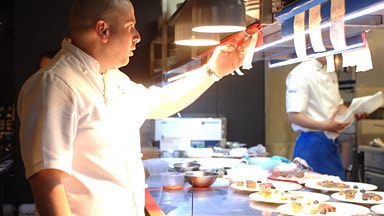Chef de cuisine, Executive chef or Head Chef
The head honcho of the kitchen manages the kitchen overall; supervising staff, creating the menu, sourcing produce and ingredients, and training kitchen staff. The head chef of a smaller restaurant might cook all the time; a chef de cuisine or executive chef of a larger restaurant might cook rarely or on special occasions, with a head chef reporting to them.
Sous chef
The sous chef is the second in command in the kitchen, and may stand in for the head chef when they’re off duty. A varied and demanding daily role which as well as making sure service is the best it can be, can see them sorting out anything from staff disputes to payroll issues.
Chef de partie
This is a chef who is responsible for a specific station of the kitchen, which concentrates on a particular area of the menu. In larger restaurants, these chefs may have cooks or assistants working under them, and there are several different chef de partie positions, including roast chef, fish chef and vegetable chef, with the sauté chef usually at the top of the hierarchy.
Pastry chef
This type of chef de partie in a larger restaurant is a specialised position with a separate team (and sometimes, kitchen) and prepares all the good stuff on the menu – pastries, desserts, sweets and baked items. Pastry chefs, of course, may also have one of those most delicious of businesses, a patisserie, selling their pastries and sweets to the public.
Restaurant Manager
A restaurant manager has a varied role, supervising the front of house staff, handling customers’ problems, and dealing with and tracking vendors’ deliveries. They also schedule employees’ shifts, hire staff and work with the head chef to manage the kitchen staff and budgets. Sommelier
A sommelier is in charge of sourcing wine, storing it and developing the wine list of a restaurant by suggesting wines which will complement each dish on the menu. The sommelier of a restaurant is in charge of the wine service, so also trains other staff to keep them informed. As well as wine, a sommelier might also be working with any other beverages served at an establishment. Sommeliers also work on the restaurant floor, talking to diners and suggesting wine choices.
Supplier
With increasing interest in sustainable farming, seasonality, local produce and organic ingredients, the quest for the best ingredients and fresh produce leads quality restaurants to seek out food suppliers and farms which specialise in anything from cheese and olive oil, to beef and quail. Some suppliers build their reputation and business on one particular quality product.
Restaurateur
Owning a restaurant is a risky business not for the faint hearted but for the successful, the rewards are worth the stress. A restaurateur can be a purely financial role or more hands on, or in the case of a chef/owner, an all consuming concern.
Chocolatier
A chef who specialises in chocolate (and who possibly has one of the best jobs in the world), making chocolate creations using techniques such as tempering, molding and sculpting.
Cheese expert
Sometimes called a fromager or cheese master, an authority on all things cheese has extensive knowledge of types of cheeses, cheese making, storing and tasting, and among other cheesy pursuits, can be found advising restaurants on their cheese selections. The title of Maître Fromager is awarded by France’s Guilde des Fromagers to the truly worthy. An affineur is someone who matures and ripens cheese.
Baker
Skilled at baking and selling bread, some bakers distinguish themselves by concentrating on sourdough bread and artisan baking, which has made a great comeback.
Food writer
Writing about food, cooking and restaurants certainly has its benefits – no wonder so many people want to do it! Writing about food in features and columns in print magazines, newspapers and supplements, and online is a much coveted job. Many budding food writers are also self-publishing through food blogs. Other related jobs including food styling, which is preparing food to be photographed by a food photographer.





























